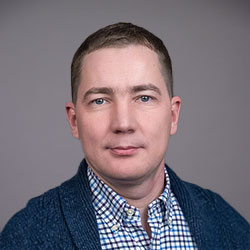2.6.17.Material science
Materials science (by industry) is a field of science and technology that deals with the development of new materials with a given set of properties by establishing the fundamental patterns of the influence of composition, structure, technology, as well as operational and other factors on the properties of materials. The interdisciplinary nature of materials science is due to the need to ensure scientific and technological progress and sustainable development of various industries and construction through the use of new high-performance materials of increased operational reliability, intensive and energy-saving technologies, expansion and improvement of the raw material base.
Research areas:
1. Theoretical and experimental studies of the fundamental relationships between the composition and structure of materials with a complex of physical, mechanical and operational properties in order to ensure the reliability and durability of materials and products.
2. Establishment of regularities in physicochemical and physico-mechanical processes occurring at interfaces in heterogeneous structures.
3. Development of scientific bases for the selection of materials with desired properties in relation to specific conditions for the manufacture and operation of products and structures.
4. Development of physical-chemical and physical-mechanical processes for the formation of new materials with unique functional, physical-mechanical, operational and technological properties, optimal cost and environmental friendliness.
5. Establishment of patterns and criteria for assessing the destruction of materials from the action of mechanical loads and the external environment.
6. Development and improvement of methods for studying and controlling the structure, testing and determining the physical, mechanical and operational properties of materials on samples and products.
7. Theoretical and applied problems of standardization of new materials and technological processes of their production, processing and processing. Quality management systems, certification and accreditation of materials and technological processes.
8. Development and computer implementation of mathematical models of physicochemical, hydrodynamic, thermal, chemorheological and deformation transformations in the production, processing, processing and operation of various materials. Computer design of composite materials. Computer analysis and optimization of the processes of obtaining and exploitation of materials.
9. Development of ways to improve the corrosion resistance of materials in various operating conditions.
10. Development of coatings for various purposes (hardening, wear-resistant and others) and methods for controlling their quality.
11. Development of forecasting methods and evaluation of the residual resource of materials in mechanical engineering.
12. Development of scientific bases for the integrated use of raw materials, local raw materials and man-made waste to obtain materials for building products and structures.
The curriculum contains profile and auxiliary disciplines; preparation for examinations of the candidate’s minimum in English and the history of science and technology is provided.
Profile disciplines in the curriculum:
• Applied materials science
• Modern methods for analyzing the structure and properties of materials
• Management of the structure and properties of materials
• Features of the formation of the structure and properties of metallic nanomaterials
Achievements of the institute/scientific school in this area — topics of implemented R&D projects:
• Development of a technological process for stamping forgings, providing a reduction in metal consumption, LLC Mountain Instrument
• Effect of diffusion surface alloying and subsequent strain hardening on the tribiological properties of the tool, Ministry of Science and Education
• Comparative tribological studies of lubricants on the SMTs-2 friction machine according to the block-roller scheme, LLC OMEGA-M
• The use of digital modeling and big data to improve the efficiency of mechanical processing of titanium blades of steam turbines and their operation in conditions of drop impact erosion, Russian Science Foundation
Requirements for applicants: in addition to the general requirements for applicants to graduate school — knowledge of Russian / English in a level sufficient to work with Russian-language / English-language literary sources in the specialty.
